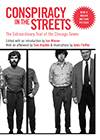Harper’s magazine, by John Leonard:
“Even as scholars ransack the past for bad behaviors and shameful secrets, so are their own windows and closets looked into by Jon Wiener, a professor of history at UC Irvine who covers the modern university as if it were a police beat. Historians In Trouble, like his earlier collection of essays, Professors, Politics and Pop (1991), turns the faculty lounge into a crime lab. Here, Elizabeth Fox-Genovese, Allen Weinstein, and Stephan Thernstrom get away with academic murder, while Mike Davis, Michael Bellesiles, and David Abraham don’t, and who really cares if Doris Kearns Goodwin and Stephen Ambrose are plagiarists so long as their books still sell in the hundreds of thousands?
“When a scholar behaves badly it helps to have right-wing friends, where George Bush will press a perfumed poultice to your wound with an appointment to the National Council on the Humanities. On the other hand, it hurts to have a vociferous enemy, like the gun lobby or the booster pages of the Los Angeles Times or another historian with an axis of evil to grind on your same subject. And on the third hand, a popular teacher need not suffer for having lied about her service in Vietnam, and a tenured professor who abused young boys and lied about it can go on for years collecting hundreds of thousands of make-work dollars for “non-classroom duties.”
“You probably don’t know as much as you think you do about many of these cases because they are so lazily reported and quickly abandoned in the mainstream/jetstream media. The intrepid Wiener goes into court documents and behind the newspaper and network scenes to tell us about the coverups, screwups, and secret settlements. He also appends a Where Are They now.
“Is academic dishonesty more widespread than it used to be, or just more widely reported? Wiener suspects the former-once upon a time we expected disinterested scholars to pursue the truth no matter what; of course, we also expected companies to pay us the pensions they promised and bankers not to steal-but what really depresses him is inconsistent policing. Not even promises by the friendly folks at the American Historical Association to toughen up the editing of their own Review persuade him that power won’t go on protecting protégés and punishing pariahs.” —
Copyright – 2005 Harper’s Magazine
The Guardian (London), by Steven Poole:
“The title made me think of a nice, pipe-smoking fellow caught stealing custard creams from the biscuit tin; in fact this fascinating book examines a dozen recent “history scandals” in the US, and asks what happens when a historian is charged with falsification, plagiarism or plain unsavoury behaviour. Numerous students complained of “abuse and harassment” by anti-feminist writer Elizabeth Fox-Genovese: her university settled out of court, and she was eventually appointed to the National Council on Humanities by Bush. Meanwhile, historian Michael Bellesiles wrote a book claiming that American gun ownership was far rarer in the 18th century than is usually claimed: pouncing on footnote and table errors, the NRA and other lobbyists hounded him out of his job. There is also the teacher whose civil disagreement with some black students was amplified by the right into a totally untrue story of “accusations of racism”; and the Marxist academic whose book on environmental dangers in Los Angeles infuriated the real-estate and construction industries. In the end, as Wiener sadly notes, the seriousness of the “crime” is irrelevant and the power of your enemies is all.”
© Guardian Newspapers Limited 2005
Library Journal:
“Cultural historian Jon Wiener (history, Univ. of California, Irvine) writes regularly for The Nation on the politics of academe. His thesis here, presented in a style as readable as any political thriller, boils down to a starkly ideological postulate: historians working from a Marxist/leftist perspective are forgiven no minor trespasses, while those who explore the past to profit conservative agendas are rewarded with scant regard to whatever scandal their work occasions. Amazingly, Wiener presents a credible if less than decisive case. And in this book of cases, none attracts his indignation more than the tale of Bancroft Prize winner Michael Bellesiles, whose briefly lauded revisionist history of American gun culture came under such sustained questioning from within the academy-a point Wiener obscures by weighting the opinions of highly regarded Colonial historians in equal measure to National Rifle Association staff and outright, unaffiliated crackpots-that Emory University fired him from a tenured position. Nor is it certain that the Holocaust historian David Abraham-despicable and unprecedented as his hounding may have been-was merely guilty of sloppy note-taking. But Wiener has to be given enormous credit for publicizing equal failings by right-wing historians and for the disinterest with which he considers recent cases involving three well-known, politically mainstream public intellectuals. Essential for all academic libraries, along with Ron Robin’s Scandals and Scoundrels.” — Scott H. Silverman, Bryn Mawr Coll. Lib., PA
Copyright(c) 2005 Reed Business Information, Inc.
Los Angeles Times: “Timely . . . makes the case clearly and forcefully.”
“This provocative book raises intriguing questions about how level the playing field is in which historians work. Is it, in fact, slanted in such a way that powerful political forces can make or break the reputation of a historian? Wiener’s case studies are, in themselves, fascinating exmaples of the relationship between political clout and professional advancement.” — HOWARD ZINN
“If you think academics live in ivory towers, you probably still believe in Santa Claus and the tooth fairy. But if you appreciate the skewering of scoundrels by a critic of high ethical acuity, you’ll love this book. Jon Wiener is our keenest connoisseur of academic depravity. He writes brilliantly of the many historians who have gotten in trouble in recent years. And he writes even more brilliantly of the college presidents, the professional associations, the faculty unions, the prestigious scholars, and the American president who have responded to these troubles with all the moral sense of a mollusk.” — Michael Zuckerman
Praise for Jon Wiener and his work:
“History’s best-known investigative reporter.” – Journal of American History
“Gutsy, interesting, and well-documented.”” – Publishers Weekly
“Wiener is a clever writer and serious thinker.” – Library Journal






